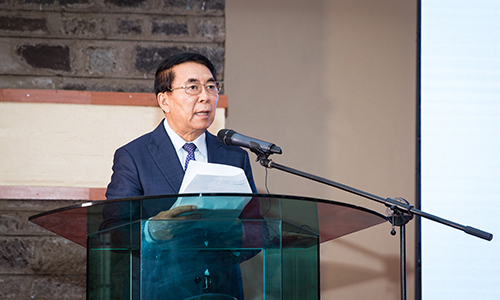CAS president lists technology ‘bottlenecks’ faced by country
Source: Global Times Published: 2020/11/25 17:17:02

Bai Chunli, president of the Chinese Academy of Sciences (CAS), speaks during the opening ceremony of an international conference on biodiversity at Maasai Mara University, Kenya, Sept. 4, 2019. An international conference on biodiversity co-organized by the Alliance of International Science Organizations (ANSO), Sino-Africa Joint Research Centre (SAJOREC) and Maasai Mara University kicked off here on Wednesday. (Xinhua/Lyu Shuai)
China should enhance research and development of strategic sciences and technologies to support their independence and sustainability, said Bai Chunli, president of the Chinese Academy of Sciences (CAS), on the 17th caijing annual forum held on Monday.
Bai admitted during the event that China still has obvious weakness and "bottlenecks" in some high technology fields.
China's semiconductor microchips imports have exceeded the value of imported oil for many years; computer operation systems and lithography machines are still monopolized by foreign companies; more than 90 percent sensors are imported from abroad; high standard Computer Numerical Control (CNC) machine tools, specialized medical instruments, equipment and reagents all rely heavily on imports, Bai said.
"Only by making breakthroughs in these areas can help China firmly hold the initiative of development in our own hands," Bai stressed.
In contrast, Bai praised China's deep-sea and deep-space exploration programs, especially the successful launch of the Chang'e-5 on Tuesday. "Chang'e-5 will next enter earth-moon transfer orbit and bring back some lunar sample in about 20 days," said Bai.
Bai's report revealed that China invested 2.21 trillion yuan ($335.92 billion) on research and development expenditure in 2019. Research and development personnel reached 4.8 million last year, including 40.02 million university students.
During the Fifth Plenary Session of the 19th Central Committee of CPC which ended on October, the development of sciences and technologies was listed as a central area of focus. The committee cited innovation as the key to China's modernization drive and technological independence.
In the 2020 Global Innovation Index released by the World Intellectual Property Organization (WIPO), China ranks 14th and is the only middle-income economy in the top 30 economies. China has made significant progress in science and technologies development since 1980.